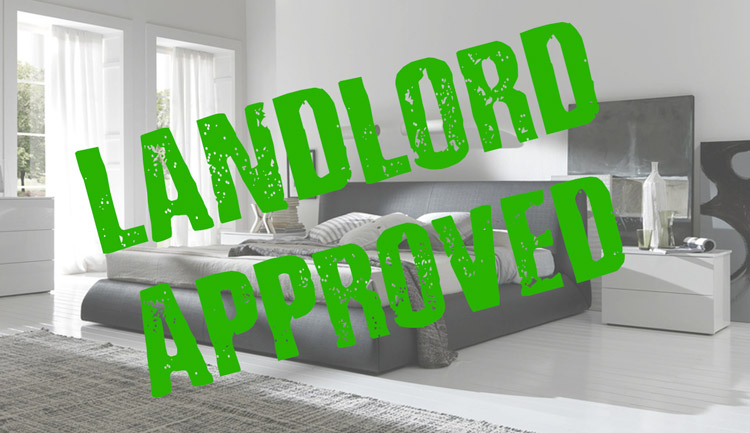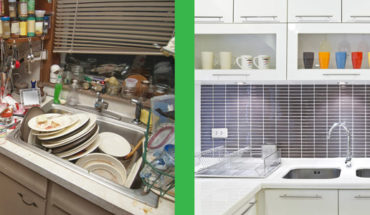

You want to know the number one question I get asked, over and over?
I want to rent on Airbnb, but I have a landlord. How do I approach them and get permission to rent out my space?
I’ll admit, that question is a bit of a doozie but let’s walk through it.
I, like many others, do not own my Airbnb property. I rent it.
And, like anyone in that situation, it is not up entirely to me to rent out the property. At the end of the day, your property owner decides if your Airbnb dreams sink or float.
It’s a pretty big conversation…and if you’re going to be successful, you’re going to need to be prepared.
You might think to yourself:
“What’s the big deal?”
“Why would my landlord care?”
That’s a common first reaction and it’s the number 1 reason why so many people rent on Airbnb WITHOUT telling their landlords. (Note that’s NOT a good idea!)
While going under the radar might work for a while, it’s inevitably going to blow up in your face.
In that case, you stand to lose a lot more than your rental money…you could get evicted and have to find a new property to live in entirely.
Now what’s ironic about that situation, and the way so many hosts go about it, is that your landlord might have actually been open to the idea of renting to you. You never asked so you’ll never know.
If they end up finding out about Airbnb by “catching you”, you’ve eroded any potential goodwill you could have had to work with in the first place.
If you try to approach the conversation AFTER you’ve been caught, your odds of getting permission are going to be dramatically lower.
So you want to do it the right way…correct? Of course you do.
Let’s get your Airbnb unit Landlord-Approved!

First off, you do not stand a chance of negotiating with your landlord if you do not understand the position they are coming from.
You must clearly understand how a landlord uniquely sees Airbnb.
Put yourself in the shoes of your landlord and try to think about the things that influence their decisions and how they see their properties.
If you don’t know much about rental properties, let me fill you in.
Landlords see their long-term rental properties (properties that are under 1,2, 3+ year contracts) as a low risk, and modest source of income.
Some landlords make a lot of money off properties, and some make only side income. But one thing that does not change: landlords see long-term rental income as low risk.
Now, imagine you own a property. Chances are you put a lot of effort into renovating it and you’ve signed your first tenant for 2 years.
Whether or not you’re a great landlord, active in helping the tenant enjoy their stay, or if you’re still investing in your property…it’s still going to make you the same amount of money every month for the term of your tenants lease.
So most landlords, logically, do not see the need to invest a ton of time and energy into their properties – they see it as a long term, fixed income stream. Any extra effort spent on the rental can often be seen a waste of time.
The worst-case scenario for a landlord is losing a tenant or property damage. Tenants can be replaced and insurance can be purchased to cover property damage…check and check.
You’re still the property owner: Now imagine your tenant approaches you and asks if they can let a large number of strangers come in and out of their space for their own profit.
Your property just went from low risk and modest income to HIGH risk and modest income.
 Airbnb Landlord Risks
Airbnb Landlord RisksSo how is it now “high risk” for landlords? Well, its at least “riskier” for multiple reasons:
But here’s the biggest one:
Homeowners insurance will deny ANY and all claims in the case that they find out the space was being rented like a business. Yes…Airbnb is a business.
Even worse…they could completely cancel the landlords insurance entirely (causing the ENTIRE building to then be illegal).
And let me remind you, they are taking this risk now with NO potential upside. It simply will not make sense for them.
In very few circumstances will a landlord be ok with you renting on Airbnb without at least getting something in return.

Now that you understand why, in fact, landlords do care about Airbnb rentals…it’s time to make a game plan.
In order to get a YES, you’re going to have to be prepared to change the risk/income equation for them. Now that doesn’t necessarily mean paying more rent, but in many cases that’s all it takes.
Be aware of your relative position before you enter the conversation:
Being in a strong negotiation position means:
If you’re in a strong position, it might only take a little bit of compromise to get a yes.
If you’re in a weak position, it could take a lot, and getting a YES might take some creativity.
On the income side:
On the risk side:
Now, this is by no means an exhaustive list of options, but they are the options that I have seen work in the past.
In my experience, these are the things landlords care about + or – a couple potential curveballs.
Be prepared to know what you think you can offer them and what you think it will cost to address their concerns.

The way I’ve explored it, there are two options to bring this up. One is directly with your landlord, the other is what I call the “nuclear option”.
If you think you have enough rapport with your landlord, then try approaching them directly.
My suggestion is that your main focus is simply starting a dialogue and not treating this like a business pitch.
Keep it simple. A landlord will not approve what they cannot understand and if you pile on information, they will get confused.
Try emailing them or talking in person like this:
I’ve recently been introduced to Airbnb when I went on my trip to Paris. Its an amazing service.
I was wondering if you had an opinion about Airbnb?”
By simply asking their opinion, you don’t prime them for confrontation and you open up a conversation simply pertaining to what they KNOW about Airbnb.
Once you’ve established what they know and think, you can have a much easier time at explaining it to them and dispelling the myths to them.
In the same conversation, I would attempt to bring up 2 things:
Then take it from there and start deploying your compromise options from above.

Here’s the nuclear option…
If your landlord isn’t receptive to this idea find out who their legal counsel is.
In 90% of cases, landlords will have SOME legal counsel that they work with on contracts, insurance, tenants rights, etc.
Either contact their lawyer and state your case, or seek out your own lawyer to explain your case.
As legal counsel to your landlord, it is their duty to represent the landlord’s best interest.
If there is an opportunity to make them more money, and is within the local laws, they’re going to obligated to present it for you.
It is much harder for a landlord to say “no” when his or her own legal counsel says, “This is legal and it can work”.
Post Contributed by Evan Kimbrell.
FREE Training: How To Become A Top Performing Airbnb™ Host & Host With Ease
✔ How to avoid the BIG mistakes that most hosts make
✔ The secret weapon of all Top 1% Hosts
✔ The pricing strategy used by professionals
✔ How to consistently get gleaming 5-Star reviews
✔ How to free up your time without becoming a "robotic host"
This free training is brought to you by James Svetec an Airbnb Expert who has managed over $1M in bookings & Symon He, the founder of LearnBNB, the #1 Airbnb hosting education blog.
Learn about all of the secrets that professional hosts don't want you to know


Thanks for the info. I’m surprised by the lack of comments on this topic. I just wanted to share my experience on this topic. Six months ago, I signed a lease for an apartment to be used specifically for short term rentals. I only signed a six month lease because I wanted to minimize any financial risk if this didn’t work out. I was completely transparent, opened up a direct line of communication with my neighbors and kept in contact with the property management company. Everything was smooth sailing. In fact, things were going so smoothly that I was added to a “waiting list” for another unit. Bookings were great, no noise complaints, no issues, etc. About 60 days before the lease was up, I contacted the property manager to ask what the renewal process was and to ask where I was on that waiting list. I never got a response so I called several times, left voice mails, all with no response. Then, I received a “Request for Possession” letter in the mail stating my lease ended on such and such date at midnight. At first, I thought, okay, I just need to renew the lease. In the meantime, I have spent thousands of dollars on professional photographers, videographers, a website, smart phone app, listing fees, virtual checkin, virtual welcome guides and general marketing. I was ready to grow this into a real business! After continuing to receive no return phone calls, no response to emails, I decided to contact a lawyer. My goal was to find out my rights, find out what options I had, if any, and ultimately, make a deal with the owner directly that would make it worth his while and at the same time allow me to keep doing what I was doing. As a side note, 50% of the apartments in the building were being used for short term rentals. I had a single unit but there were three other companies or groups who each had 4+ units. So far, the attorney reached out to the owner who said short term guests didn’t have the same respect for the property that long term guests had. Anyone who’s been doing this for any length of time knows this is total BS, at least it was in my case. I’ve had nothing but pleasant guests who have had the utmost respect. In addition, I bet my place stayed way cleaner than any long term tenant’s apartment. Not to mention, I had my own supplemental $2M commercial insurance policy that protected every one and everything. My attorney has only a few days before the end of the lease and is still trying to work something out. I’ve offered to rent every unit on the same floor, in the entire building and offered to pay more rent and/or pay the owner a cut of the profits. So far, it doesn’t look promising. I’m trying to be optimistic but have bookings that go many months into the future. I’ve been looking for alternative units but it’s either not allowed, they already have too many units being used for that purpose, the HOA doesn’t allow it, etc. It seems to me this is a new industry, it’s in high demand and is only going to grow. A smart landlord seizes opportunities vs resist change. I get the concerns, don’t get me wrong, but there are workable solutions. It just seems to me that an owner can rent to tenants who disguize their true intentions, constantly evicting people and being paranoid or they could embrace the change, make some extra money and be done with it. Thoughts?
October 25, 2015Hi Steven, What area are you in ? I would like to do the same thing in my area being Sydney Australia. Please reply with an update of how you are doing with this.
Steven Talbott January 18, 2016Hi Adam, First, to answer your question – I’m in Nashville, Tennessee. Second, to provide an update: Believe it or not, despite the fact that my lease ended on October 31st, 2015 – I am still in the same apartment. I realize that I can’t fight the inevitable and they haven’t changed their minds about putting an end to all the Airbnb activity in my building – so right now, I’m just stalling. All of the condo buildings have HOA rules against short term rentals so my only option is a multi-family apartment building which aren’t in abundance, yet. However, quite a few are well under there way to being built. The reason I didn’t have to leave on October 31st is because the notice they served was sent about a week too late. That coupled with the acceptance of my rent check created a month-to-month tenancy under the Uniform Landlord and Tenant Residential Act of Tennessee. Here we are on January 19, 2016 and I still have not been given a proper thirty day notice as required by law. My attorney sent them a letter that basically stated my rights, their obligations under the month-to-month tenancy and the fact that I would continue leasing month-to-month until proper notice was received. If they were to send me a proper notice tomorrow, I would legally have until the end of February. I’ve got 5-6 different apps on my phone working overtime to find a place to move. Things are snatched up within minutes of being posted – at least available rentals in the core downtown area. I’ve also recently paid for some Airbnb data so that I can research neighborhoods outside of the immediate downtown area where I may have much better results. My apologies for taking so long to respond – notifications were going to spam and I just sifted through my spam box where I found the questions and responses. Hope everyone’s 2016 is off to a fantastic start! Steven
April 13, 2017Hey Steven. Any update on how its been going? (: Curious what apps you’re using to scour for properties. You mention paying for airbnb data – is this mashvisor youre speaking of?
June 1, 2018The landlord either doesn’t want his flat used for such purposes or has decided to run an airbnb business from the property himself. It’s his appartment, so move out. Perhaps you should try to raise the finance to buy your own property. Then you will have autonomy.
January 30, 2019How do you figure out who the landlords are for multi-unit dwellings to even approach them about this for AirBnB
Doug Orchared September 1, 2019for $10 a month you can download “landglide” app
you get 5 searches for free just to try it out
you pull up to the building and turn on the app
it tells you who owns the property with a link to the county record
and mailing address of the owners are listed in the county record
you can go to peoplefinder also $10 a month and get the phone numbers and a bucnh of personal info on the owners and give them a call.
here’s the thing, whats stopping the landlord from doing this themselves? thats the value. In this situation, you offer ZERO value to the owner, especially since they can do it themselves. Thats how it goes with any business. IF they can do it themselves, they’ll cut out the middle man. you are the middle man.
October 2, 2017Its not Zero value. In fact it is 200% value addition. Owners cant do on their own. Its all about two way communication and getting feedbacks bothways and rankings, etc. Traditionally landlord communication was through agents aimed at long term tenancies.. Short term tenancies are mix of motel style and home atmosphere.There is value addition and change of habits and mental makeup. Thats why airbnb introduced sharing/managing hosting functions.
April 10, 2018It’s simple… They wanted you out because you gave them the bright idea to do Air BNB themselves. It wasn’t about you at all. They saw dollar signs $$$.
I say everyone should milk it for what it’s worth under the radar if the landlord isn’t around much. Then buy your own property and start your Air BNB hassle-free because it’s YOURS!
This is a great topic and very well covered. Steven, I’m sorry to hear of your troubles. Nevertheless you’ve been far more responsible than those many hosts who fly under the radar and neglect to tell their landlord that their essentially sub-leasing their property to short-term tenants. We’ve heard so many cases of tenants being evicted on these grounds.
Ultimately we would guess that your landlord has the right to turn down your proposal. So if the bargaining fails, perhaps it’s time to move on and find a new lodging. Sorry for the loss of your investment of time and money. We hope you have better luck soon!
But you’re not leasing. Do you lease the hotel? No, you’re a guest. You have short term guests in your airbnb
December 16, 2018Do you have any templates on how and agreement between the homeowner and property manager would look like for a rent to rent situation?
April 14, 2016Your landlord probably realized how lucrative your Airbnb business is and decided not to sit on the sidelines anymore. Unfortunately, it is completely legal for a landlord to decide not to renew a lease (they are not evicting you, simply not renewing or extending), and as such, they don’t have to give you any reason for their decision. Your best bet might be to move on to a different property and simply sign a longer lease this time. Ultimately, you want to buy properties in order to avoid having to follow someone else’s rules.
Steven Talbott May 4, 2016Thank you for chiming in, Sabrina. I don’t disagree with you but it’s not quite that simple. Here’s what: 1) Our local short term rental code, passed last year and requires hosts obtain a permit and pay hotel occupancy taxes. No problems there. The code also puts a restriction on the number of single family homes allowed to be used as short term rentals. Although an arbitrary cap, it does exist and is 3%. Most areas in downtown and surrounding areas are completely maxed out. Only 1 permit can be given for an address and that permit is not transferrable. 2. Interestingly, the limit doesn’t apply to multi-family buildings BUT every condo HOA I’ve checked, prohibits rentals less than 30 days. 3. This means my only option is really apartment buildings. I was able to get a unit at a different building by agreeing to use the property as a corporate rental. I agreed but with the caveat that I would be filling any gaps between corporate rentals in the best way that generated revenue. In other words, I am only marketing to business travelers but in cases when I don’t have a business traveler, I lease it to leisure guests after a thourough screening process. I’ve worked endlessly on tweaking a proposal and have sent it to about 20 owners or property owners so far. I tweak each and every time I send one and definately on the right track. I’m not finding it nearly as difficult to start a discussion now that I have a formal online proposal going out. I decided to document my experiences as I move forward and will continue adding updates there as well. I remain optimistic and am trying to secure a few more properties in the next 30 days. I am definately shooting for longer term leases this time so thanks for that advice! Steven